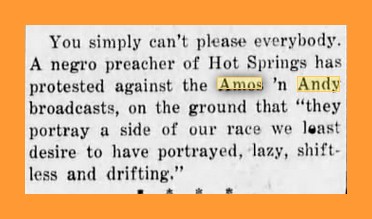On January 1, 1931, the Elizabethville Echo printed a brief news item about a protest against the radio show, Amos ‘n Andy. The characters were played by Freeman Gosden and Charles Correll, two white men with minstrel traditions, who portrayed in stereotypical dialect, two African American characters who were supposedly from Harlem.
Heading the news item, the editor and proprietor, Milton A. Miller, flippantly stated, “You simply can’t please everybody.”
You simply can’t please everybody. A negro preacher of Hot Springs has protested against the Amos ‘n Andy broadcast on the ground that “they portray a side of our race we least desire to have portrayed, lazy, shiftless and drifting.”
Nationwide, there were many protests against the radio show but no other references to it were found in the Echo. From the editor’s attitude in presenting the news of the protest, he was apparently OK with the way the show was presented.
Milton A. Miller was postmaster of Elizabethville and a member of a racist, whites-only organization, the Odd Fellows (I. O. O. F.). See:
Miller’s obituary indicated that he was an active member of Salem Reformed Church in Elizabethville, and served as superintendent of its Sunday School for a number of years.
It is difficult to understand how Milton A. Miller appeared to be unaware of the on-going national protests to the radio show. His reference to the “negro preacher of Hot Springs” – both in failing to name him and his religious affiliation – are suspicious considering where the national opposition was coming from. According to Wikipedia:
The first sustained protest against the program found its inspiration in the December 1930 issue of Abbott’s Monthly, when Bishop W. J. Walls of the African Methodist Episcopal Zion Church wrote an article sharply denouncing Amos ‘n’ Andy for its lower-class characterizations and “crude, repetitious, and moronic” dialogue. The Pittsburgh Courier was the second largest African-American newspaper at the time, and publisher Robert L. Vann expanded Walls’ criticism into a full-fledged protest during a six-month period in 1931. As part of Vann’s campaign, more than 700,000 African-Americans petitioned the Federal Radio Commission to complain about the racist stereotyping on the show.
_______________________________________
News clipping from Newspapers.com.
Corrections and additional information should be added as comments to this post.
